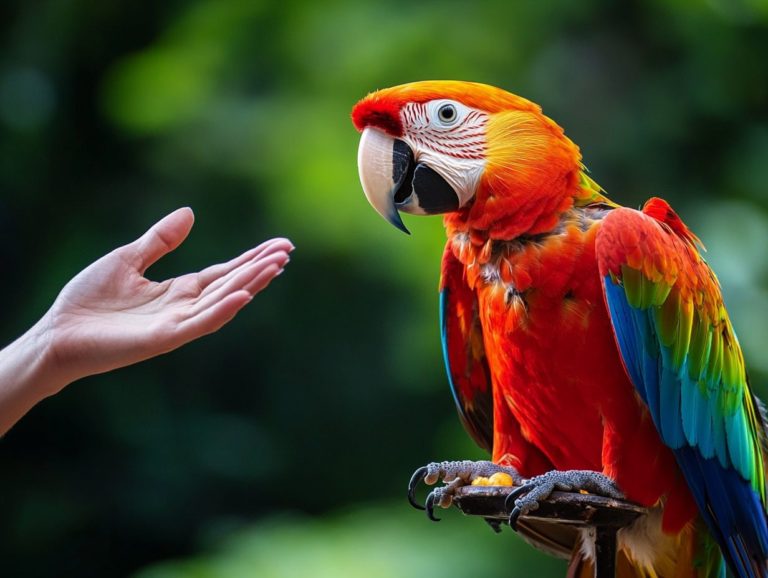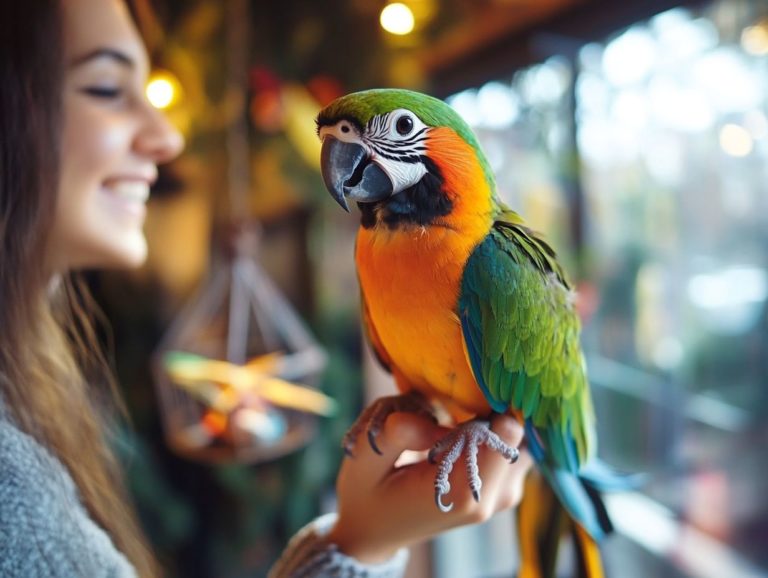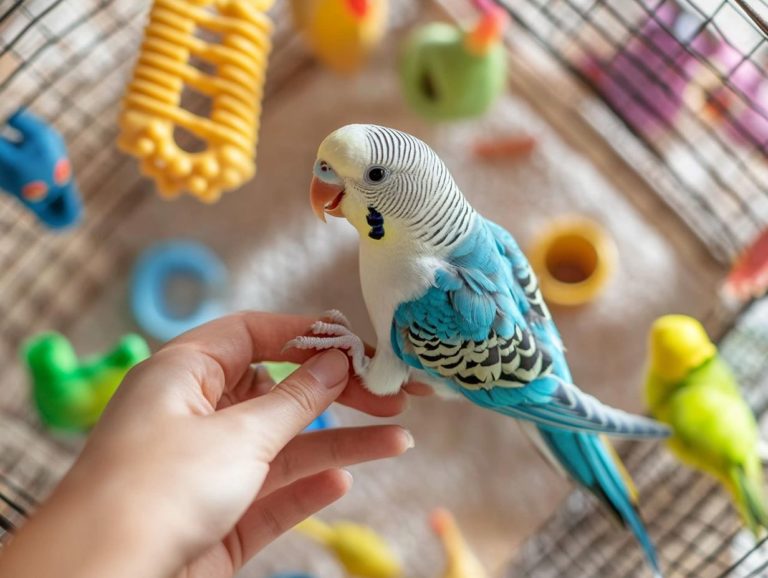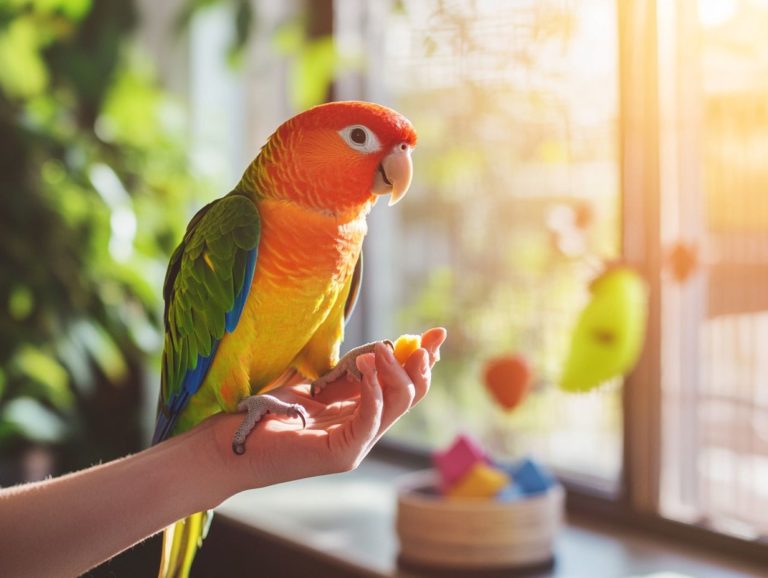5 Ways to Build Trust with Your Bird
Building a strong bond of trust with your bird is essential for cultivating a happy and harmonious relationship. Like any pet, your feathered friend flourishes on connection, understanding, and a sense of safety.
This article delves into five effective ways to nurture that trust, from spending quality time together to deciphering your bird s unique body language. It also highlights the significance of trust, identifies common pitfalls that can jeopardize your bond, and offers insights on how to restore that trust if it’s ever compromised.
Whether you re a seasoned bird owner or just stepping into the world of avian companionship, nurturing this vital trust will undoubtedly lead to a more rewarding experience for both you and your bird. Start building that bond today to ensure a loving relationship!
Contents
- Key Takeaways:
- 1. Spend Quality Time with Your Bird
- 2. Use Positive Reinforcement Training
- 3. Be Consistent with Your Interactions
- 4. Learn Your Bird’s Body Language
- 5. Provide a Safe and Comfortable Environment
- Why Is Trust Important in Your Relationship with Your Bird?
- Frequently Asked Questions
- What are 5 simple ways to build trust with my bird?
- How should I provide consistent positive reinforcement to my bird?
- Why is spending quality time with my bird important for building trust?
- How can I better understand my bird’s body language?
- What can I do to provide a safe and comfortable environment for my bird?
- Is it normal for building trust with my bird to take time?
Key Takeaways:

- Spend quality time with your bird to build a strong bond and trust.
- Use positive reinforcement training to establish trust and reinforce good behavior.
- Consistency is key in building trust with your bird. Stick to a routine and be predictable in your interactions.
1. Spend Quality Time with Your Bird
Spending quality time with your bird enriches its environment and strengthens the bond between you. This interaction is an essential element of responsible pet care.
Engaging in activities like preening, feeding, and simply observing your feathered friend fosters trust and affection. This gradual process is crucial for nurturing a friendship, and learning how to help your bird overcome fear can allow your bird to feel comfortable and secure.
Incorporating a variety of engaging toys can significantly enhance interactions, stimulating both physical and mental activity. Using a gentle voice while speaking can soothe your pet, emphasizing the importance of tone in communication.
Preening not only mimics natural behaviors but also serves as a bonding activity that reinforces trust. These intentional efforts lead to a deeper understanding of your bird’s unique personality.
Over time, this interaction can transform everyday moments into cherished memories, ensuring a lasting relationship founded on trust and care.
2. Use Positive Reinforcement Training
Positive reinforcement training is an effective method for teaching your bird desired behaviors. This means rewarding your bird when it does something good, using rewards such as training treats and clickers.
This approach also helps with learning and fortifies the bond between you and your feathered companion. By offering treats or verbal praise when your bird performs a desired action like stepping onto your finger or mimicking a sound it begins to associate those behaviors with positive outcomes.
Techniques like shaping, rewarding successive approximations to the desired behavior, can be particularly effective. Over time, these small victories build your bird s confidence, transforming training into an enjoyable experience.
Ultimately, this method cultivates a harmonious environment and deepens the trust that your bird has in you as its owner.
3. Be Consistent with Your Interactions
Being consistent in your interactions with your bird is vital for fostering trust and understanding. This consistency helps your avian companion feel secure and respected.
Establishing a routine is essential because it offers your feathered friend a sense of predictability that can ease anxiety. Each day, strive to maintain consistent feeding times and training sessions.
Using the same cues and commands during these interactions is beneficial, allowing your bird to learn and respond with confidence. Adding playful activities and cheerful tones can make the process enjoyable and reinforce positive behaviors.
Ultimately, this routine can forge a deeper connection, making training a fulfilling journey for both you and your bird.
4. Learn Your Bird’s Body Language
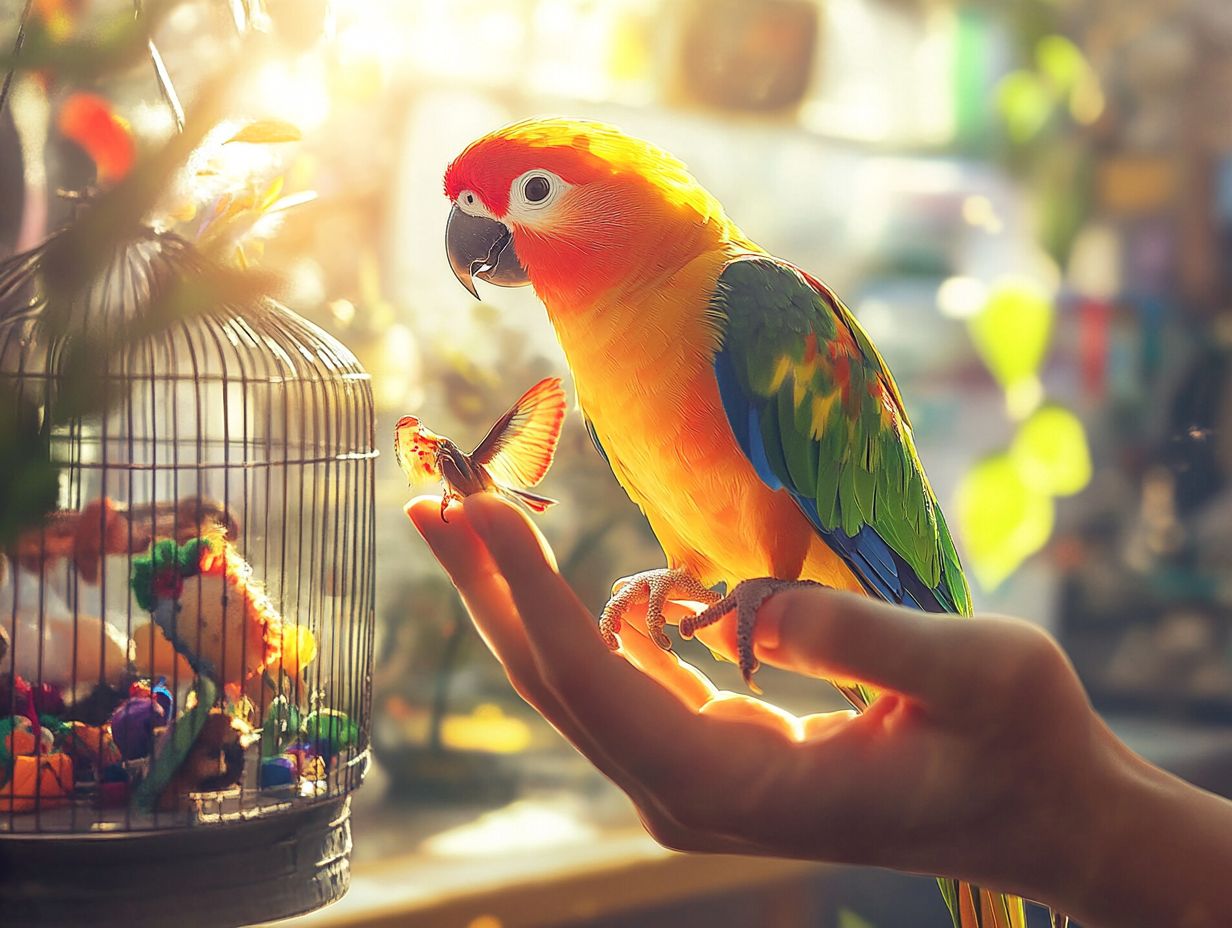
Learning your bird’s body language is crucial for effective communication. It offers valuable insights into its emotions, needs, and overall well-being. This attentiveness enhances your relationship.
Different bird species display unique body language cues. For example, an Alexandrine parrot might puff up its feathers when feeling threatened, signaling discomfort. In contrast, a Quaker parrot may crouch low and flap its wings excitedly when it’s happy.
By observing these behaviors, you can better understand when your bird is content and when it may be experiencing stress or anxiety. This creates a nurturing environment where your bird feels safe, ultimately strengthening the bond between you and your feathered friend.
5. Provide a Safe and Comfortable Environment
Creating a safe and comfortable environment for your bird is essential for its health and happiness! A well-designed space allows your feathered friend to relax, thrive, and engage in natural behaviors.
Your ideal cage setup should feature elements that cater to your bird’s natural needs. Add perches at different heights, ensure ample room for movement, and provide proper ventilation.
Don t underestimate the importance of environmental enrichment! Incorporating toys that stimulate your bird s mind and encourage play is key to preventing boredom. Safe hiding spots can also offer your bird a sense of security, providing a retreat when it seeks privacy.
By making sure the space is both visually appealing and comfortable, you create a nurturing atmosphere that promotes positive behaviors like socializing and exploration.
Why Is Trust Important in Your Relationship with Your Bird?
Trust is the foundation of your relationship with your bird! It fosters a deeper bond that elevates communication, reduces stress, and encourages enjoyable interactions. To learn more about building this trust, check out our guide on how to bond with your newly adopted bird. This trust is vital for cultivating a fulfilling companionship.
Once you establish this essential trust, you’ll notice a significant shift in your bird’s behavior. They’ll feel more secure and be more inclined to engage with you. Incorporating consistent routines, gentle handling, and tips for teaching birds to be confident nurtures this trust over time.
These practices enhance your bird’s emotional health and support their physical well-being. Every encounter can become a delightful experience rather than a source of anxiety!
As trust flourishes, your bird may become more social, vocal, and interactive, greatly enriching the quality of life for both of you. This evolution leads to a harmonious living environment where both pet and owner thrive together.
What Are Common Reasons for a Lack of Trust in Birds?
A lack of trust in birds often arises from past negative experiences, poor environmental conditions, or insufficient communication. These factors can lead to nervous behaviors and a reluctance to engage.
Improper handling during formative stages, the use of harsh training methods, or exposure to stressful environments can significantly amplify these issues. Observing body language is crucial! Signs like puffed feathers, rapid head movements, or avoidance reactions clearly indicate anxiety.
Create a calm environment and establish a gentle routine to foster a sense of security and build confidence. By recognizing these signs and addressing them with patience and positive reinforcement, you can help your feathered companions feel more at ease and learn how to bond with your pet bird to gradually regain their trust.
How Can You Tell If Your Bird Trusts You?
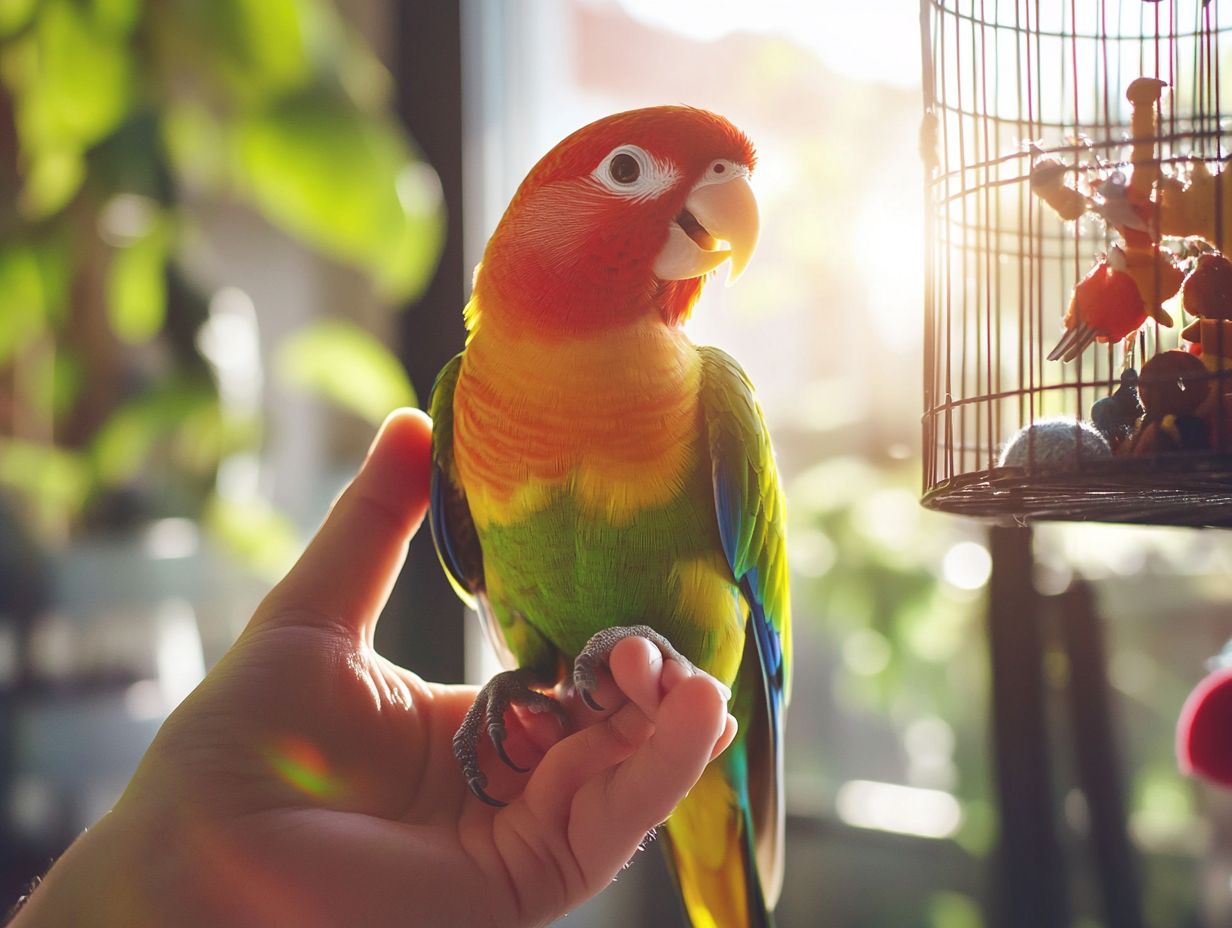
You can tell if your bird trusts you by observing its body language and behaviors. Look for signs like a relaxed posture, preening in your presence, and eagerness to engage in playful interaction.
Also, watch for your feathered friend approaching you confidently, vocalizing in cheerful tones, or even mimicking your sounds. Each of these actions shows that your bird feels secure and enjoys your company.
Recognizing these behaviors is essential. They showcase your pet s trust and help build a deeper bond. By creating a space where these signs can happen, you invite a more fulfilling and harmonious relationship with your avian companion.
What Are Some Signs of a Strong Bond with Your Bird?
A strong bond with your bird shows in affectionate behaviors, like snuggling, mimicking your sounds, and showing interest in your daily activities. This reflects a sense of companionship.
You ll notice this connection more when your bird engages in preening. It’s not just grooming; it signifies trust and reinforces their social structure. Playful interactions, such as chasing after toys or performing tricks, create a joyful atmosphere filled with mental stimulation.
When your bird chirps or whistles back at you, it s a joyful invitation to connect! Each of these behaviors enhances your feathered friend s emotional well-being and promotes a healthier, more enriched life overall, which is essential for their optimal health.
What Are Some Common Mistakes That Can Break Trust with Your Bird?
Common mistakes that can erode trust with your feathered companion include abrupt handling, inconsistent training techniques, and failing to recognize signs of discomfort. These mistakes can lead to negative experiences that hinder effective communication.
If you approach your bird without gentle handling or respect for its personal space, you might unintentionally create fear or anxiety. Consistent communication is crucial because confusing cues can make these intelligent creatures unsure of what you expect from them, affecting their experience and trust in you.
Don t overlook subtle changes in your bird’s behavior like shifts in sounds they make or posture. These are vital opportunities to strengthen that precious bond. By practicing patience and tuning into your bird’s emotional needs, you can create a healthier and more trusting relationship and engage in intuitive communication.
How Can You Rebuild Trust with Your Bird if It Has Been Broken?
Rebuilding trust with your bird after it has been broken takes time, patience, and a thoughtful approach. Focus on giving positive feedback and gentle interactions to gradually mend that relationship. You can also explore the top 10 tricks to teach your pet bird to make each interaction rewarding and promote a comfortable environment.
Creating a comfortable space is crucial in this healing journey. It helps your bird feel safe and secure in its surroundings. Using positive reinforcement techniques like rewarding your bird with treats, such as millet, or kind words when it engages positively can help strengthen that bond.
Remember to let your bird approach you at its own pace; forcing interactions may backfire. For more insights, check out how to create a safe space for your adopted bird. Earning back trust relies on consistent and respectful communication. Show that you understand its needs and allow your bird to regain confidence in you as a safe companion.
Frequently Asked Questions
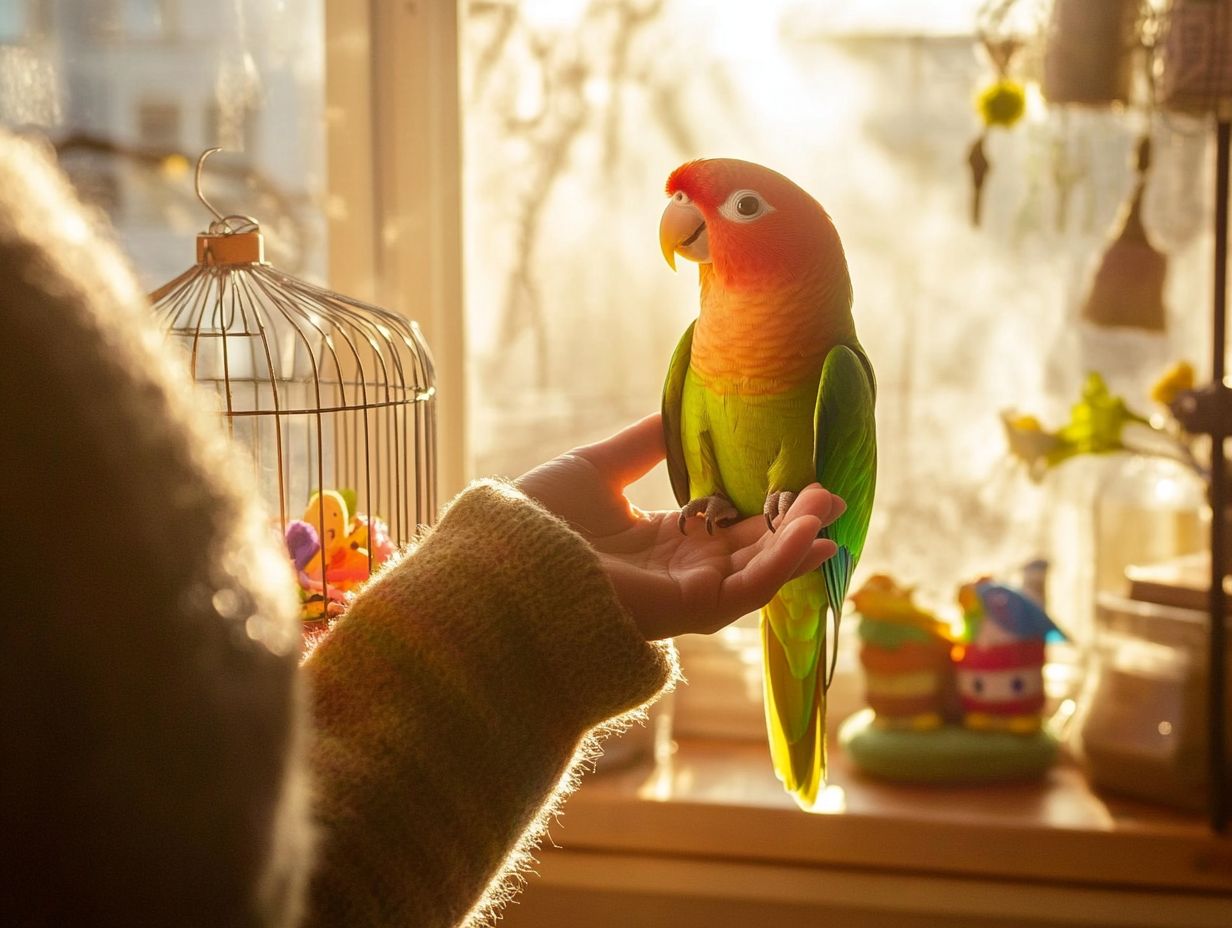
What are 5 simple ways to build trust with my bird?
Here are 5 simple ways to build trust with your bird: consistent rewards, quality time, understanding their signals, creating a safe space, and being patient.
Start building that trust today! Your bird is eager for your companionship.
How should I provide consistent positive reinforcement to my bird?
Let’s explore simple ways to make your feathered friend feel appreciated! Consistent positive reinforcement can be offered by giving your bird treats, such as training treats, using a calm, soothing voice, and employing a method where a sound signals to your bird that it has done something right.
Why is spending quality time with my bird important for building trust?
Spending quality time with your bird helps you bond and develop a stronger relationship through social interaction. This makes your bird feel more comfortable and trusting towards you.
How can I better understand my bird’s body language?
Understanding your bird’s body language means observing its behavior and reactions in various situations. This includes reading their signs and responses. Research common body language cues for your specific bird species to enhance your understanding!
What can I do to provide a safe and comfortable environment for my bird?
Ensure your bird enjoys a spacious, clean cage! Provide access to fresh food and water, and include toys and perches for stimulation to promote environmental enrichment. Keep the area free of potential hazards and always supervise your bird during out-of-cage time.
Is it normal for building trust with my bird to take time?
Absolutely! Building trust takes time, patience, and consistent effort. Every bird is unique and may require different amounts of time to feel completely comfortable and trusting towards their owner.

